Testosterone — Why He, And Yes, She Need It. And How We All Can Manage It.
As with most of my blog articles, they arise from a question, typically from a client. And when I get asked a question, with my lifelong curiosity, accumulation of fitness certifications, and general health and training knowledge I usually give, what I like to think is a somewhat educated answer.
So when I was asked about testosterone for the first time by a female I was intrigued. I guess I was just thinking of testosterone as a male “thing”. And honestly, I probably wouldn’t have been compelled to write about it until it was a female client that asked me, or told me she was looking into taking testosterone supplements to help burn fat. Insert thinking emoji.
What really compelled me to write about this was my desire to make sure she didn’t take supplements or drugs. Apart from lots of coffee, protein shakes, green drinks, and Garden of Life Meal Replacement, I’m not one to take anything. Using drugs and similar aids to me is like putting a knee brace on when there are much bigger problems creating the knee pain. Let’s attack the real problem. Get plenty of sleep, eat mindfully, and be active and stretch your joints as much as possible. If you can maintain a healthy lifestyle, why would you need testosterone supplements?
Hence my theory on testosterone. It’s sort of the, what came first the chicken or the egg thing.
Are you unhealthy because your testosterone is low, or is your testosterone low because you’re unhealthy?
So the goal of this is give you (and me) a better understanding of what testosterone is, its benefits, and how to best manage it, naturally.
What is it?
It’s a hormone. Hormones are chemical messengers that trigger changes in the body. Specifically, it is an androgen which is a type of hormone that regulates the development and maintenance of male and female characteristics in vertebrates by binding to androgen receptors. In humans and other vertebrates, androgens are made primarily in the male testes, female ovaries, and adrenal glands. Kinds and potencies vary among animal groups. The brain and pituitary gland, a small gland at the base of the brain, control production of testosterone by the testes. From there, testosterone moves through our blood to do its work.
Your testosterone levels change from hour to hour. They tend to be highest in the morning and lowest at night.
Testosterone levels are highest by age 20 to 30 and slowly go down after age 30 to 35.
For males, this hormone does a lot of useful things including: sperm production, sex drive, bone mass, fat distribution, muscle size and strength, and red blood cell production. We all know that testosterone is imperative to men for many reasons.
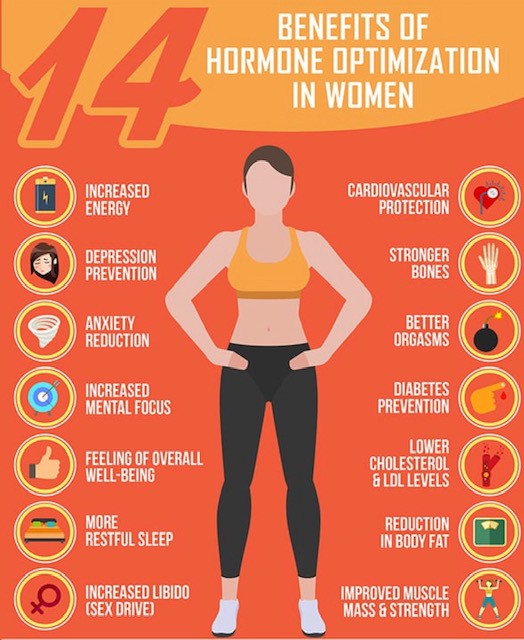
But what about women? Androgens play a key role in the hormonal process that kick-starts puberty, stimulating hair growth in the pubic and underarm areas. Additionally, these hormones are believed to regulate the function of many organs, including the reproductive tract, bone, kidneys, liver and muscle. In adult women, androgens are necessary for estrogen synthesis and have been shown to play a key role in the prevention of bone loss, as well as sexual desire and satisfaction. It is best known for its crucial role in women’s sex drive or libido. More specifically, testosterone in women is responsible for the sensitivity of a woman’s nipples and clitoris which contributes to sexual pleasure. Testosterone not only enhances the sexual mood of a woman, but the experience as well.
So testosterone is certainly not a “male only” hormone.
It’s the most abundant biologically active female hormone. Testosterone’s role in women’s health goes well beyond sex drive and libido. There are androgen receptors located in almost all tissues including the breast, heart, blood vessels, GI tract, lung, brain, spinal cord, peripheral nerves, uterus, bladder, ovaries, vaginal tissue, endocrine glands, skin, bone, bone marrow, synovium, muscle and adipose tissue.
A Deeper Dive Into What It Does For Us
Men & Women (With more women information below)
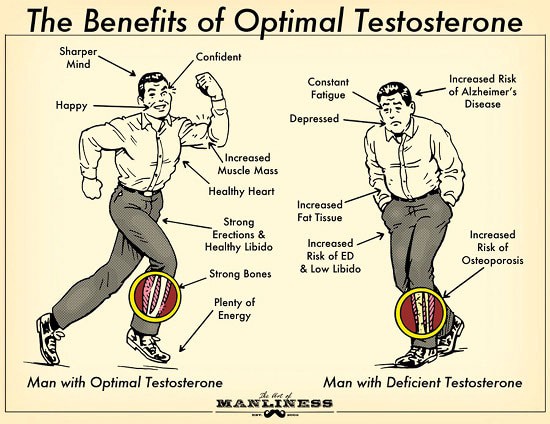
- Increases bone strength and decreases osteoporosis chances on older males — We think of osteoporosis primarily in females, but men have to think about it as well. It increases bone density by stimulating bone mineralization as well as decreases bone resorption. Elderly men suffering from osteoporosis typically have sub-optimal testosterone levels.
- Low levels may cause depression (or does depression cause low levels?) — Is it the low testosterone causing depression or is depression causing low testosterone? Researchers are iffy on both. I believe it’s the latter. Meaning, our lifestyles and activities play a major role in testosterone production.
- May help cardiovascular ability — The jury is still out on whether testosterone helps heart function but scientists are more focused on the myriad of cardiovascular benefits from a more active lifestyle due to higher testosterone.
- May decrease your chances of Alzheimer’s disease — Researchers at the University of Southern California have reported that increasing testosterone levels in mice with Alzheimer’s actually slows the progression of the disease. This observation has led scientists to hypothesize that maintaining optimal T levels into old age may help prevent Alzheimer’s in humans.
- Helps decrease body fat — Testosterone plays an important role in regulating insulin, glucose, and fat metabolism. As our T levels decrease, our body’s ability to regulate insulin, glucose, and fat metabolism decreases, which in turn causes adipose tissue (i.e. fat) to begin accumulating. To make it worse, that increased fat may also contribute to further decreasing testosterone levels because it converts testosterone into estrogen.
- Testosterone improves memory, spatial awareness, and strategic thinking in both men and women — One study performed by Dutch researchers found a direct linear relationship between T levels and cognitive function, while other studies have found a linear relationship between memory loss and T levels. Because of these correlations, many researchers believe testosterone plays a role in preventing brain tissue decay in elderly men.
Women
So everything mentioned above certainly applies to both sexes, and here’s a few more specific reason why it’s important for ladies to be aware of testosterone.
- Breast Cancer — Multiple studies now show that testosterone may help guard women against breast cancer. A study in 2000 looked at the effects of testosterone and tamoxifen (a widely used chemotherapeutic agent for breast cancer) on breast cell stimulation. The study showed that breast cells exposed to estrogen showed cancer-like rapid growth, but showed significantly less growth when also exposed to testosterone. Another study published in 2003 also showed that testosterone significantly inhibits breast cell growth, leading researchers to conclude that testosterone may protect against breast cancer.
- Menopause — Testosterone was successfully used to treat the symptoms of menopause as early as 1937. It has been used to treat signs of androgen deficiency in females, including mood swings, anxiety, depression, fatigue, irritability, tearfulness, muscle loss, bone loss, memory lapse, and hot ashes, as well as sexual dysfunction.
How To Increase or Manage Testosterone

- Play sports! — These researchers took saliva samples from recreational women athletes before and after playing 10 minutes of flag football. The data showed that this short, intense burst of competitive sport triggered the immediate release of testosterone. Interestingly, the subjects’ mental state also contributed to the data. Self-rated performance scores were directly related to testosterone levels.
- Eat Well — A diet based mainly on whole foods is best, with a healthy balance of fat, protein and carbs. This can optimize both hormone levels and long-term health. Extreme dieting and extreme gorging are simply not good for testosterone.
- Get Sleep! — A week of insufficient sleep decreases testosterone by 15% in men. The ideal amount of sleep varies from person to person, but one study found that sleeping only 5 hours per night was linked to a 15% reduction in testosterone levels. One long-term study observed that those who slept only four hours per night had borderline deficient levels. One study calculated that for every additional hour of sleep you get, testosterone levels rise 15% higher, on average. Although some people seem to do fine with less sleep, research suggests around 7–10 hours of sleep per night is best for long-term health and your testosterone.
- Reduce stress and cortisol — Research is always highlighting the dangers of long-term stress, which can elevate levels of the hormone cortisol. Unnatural elevations in cortisol can quickly reduce testosterone. These hormones work in a seesaw-like manner: as one goes up, the other comes down. Stress and high cortisol can also increase food intake, weight gain and the storage of harmful body fat around your organs. In turn, these changes may negatively impact your testosterone levels.
- Vitamin Supplements — Like I said, I only like “Meal Replacement” supplements because it’s very difficult to get enough vitamins and minerals from real food. Especially if you’re working out a lot. In one study, zinc and vitamin B supplements increased sperm quality by 74%. Zinc also boosts testosterone in athletes and those who are deficient in zinc. Other studies also suggest vitamins A, C and E can play a role in your sex hormone and testosterone levels, although more research is needed. Out of all the vitamins and minerals available, the research on testosterone shows vitamin D and zinc supplements may be best.
My Take

Exercise — Lift heavy stuff, run as fast as you can, and jump. I once heard that heavy jump squats produce the most testosterone of any exercise and it sounds appropriate because you’re recruiting the most amount of muscles possible to do something that is borderline ludicrous. Overall, the research shows that the movements that produce the most amount of testosterone are the multi-joint movements such as: squat, deadlift, thrusters, push ups, bent over rows, etc. Do these (if you have questions, let me know) and then also run and jump!
Eat — If your plate looks like one color, it sucks. You should have a plate that looks like a rainbow full of different colors and textures. I like meat but you don’t have to. I also have read a lot about magnesium and zinc helping in testosterone production. Here are foods high in zinc and magnesium:
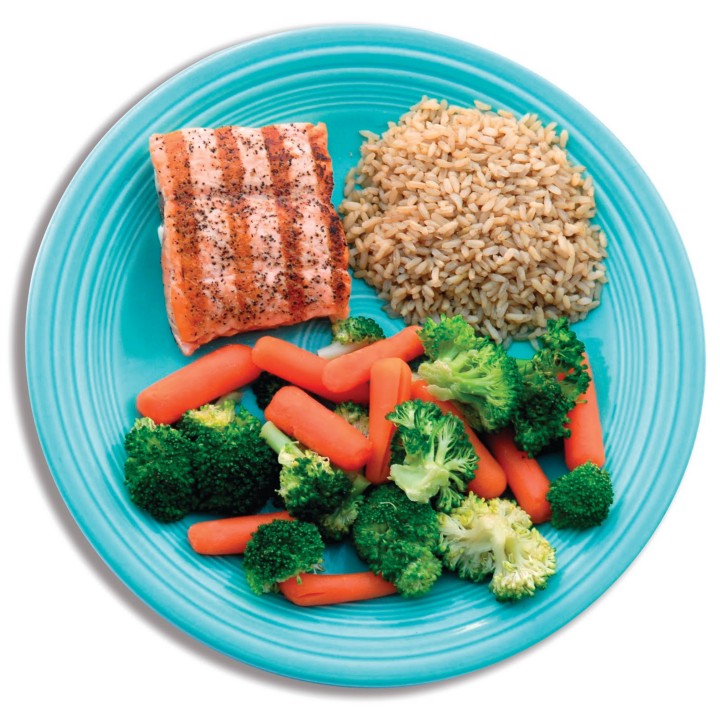
- Meat — Was there any question that meat would be instrumental in producing testosterone?
- Shellfish — King Crab Legs have a ton of zinc!
- Legumes — Legumes like chickpeas, lentils and beans all contain substantial amounts of zinc and magnesium.
- Seeds — 3 tablespoons (30 grams) of hemp seeds contain 31% and 43% of the recommended daily intake for men and women, respectively. Other seeds containing significant amounts of zinc include squash, pumpkin and sesame seeds
- Nuts — If you’re looking for a nut high in zinc, cashews are a good choice. A 1-ounce (28-gram) serving contains 14% of a man’s daily recommended intake
- Dairy — Thank goodness cuz I eat a lot! It’s good that 100 grams of cheddar cheese contains about 28% of a man’s daily recommended amount of zinc, while a single cup of full-fat milk contains around 9%
- Eggs — 1 large egg contains around 5% of a man’s daily recommended intake. This comes with 77 calories, 6 grams of protein, 5 grams of healthy fats and a host of other vitamins and minerals, including B vitamins and selenium.
- Whole Grains — In fact, eating whole grains has been linked to a longer life and number of other health benefits, including a reduced risk of obesity, type two diabetes and heart disease
- Vegetables & Leafy Greens — Potatoes are good for zinc and a few others but most veggies are not that good for zinc. However magnesium is in a lot of leaf greens, especially spinach and kale.
- Dark chocolate — Good source of zinc, bad source of calories.
- Bananas! — You need these for all protein shakes anyway.
- Avocados — Great for magnesium.
Conclusion
My brutally honest take on this is that there are no easy ways out for anything in life and if you do find an easy way out, you’re going to pay for it in the future. Meaning you can take steroids or some other testosterone enhancement now and get insane results but your body mechanics are going to change and you’re worse off in the long run. Kind of like crash dieting. You’re not going to be able to maintain it, your body doesn’t like it, and you’re in even worse shape when it’s over.
So get up, get out, and move!! Have fun doing it! Challenge yourself! You’ll be happy you did!
References:
- https://www.healthline.com/nutrition/8-ways-to-boost-testosterone#section5
- https://www.betterhealth.vic.gov.au/health/conditionsandtreatments/androgen-deficiency-in-women
- https://www.artofmanliness.com/articles/testosterone-benefits/
- https://www.hindawi.com/journals/ije/2012/789653/
- http://www.aikenbellamagazine.com/2018/03/02/the-benefits-of-testosterone-for-women-beyond-libido/
- https://www.livestrong.com/article/21635-increase-testosterone-levels-naturally-women/
- https://www.health.harvard.edu/blog/a-harvard-expert-shares-his-thoughts-on-testosterone-replacement-therapy-2009031141

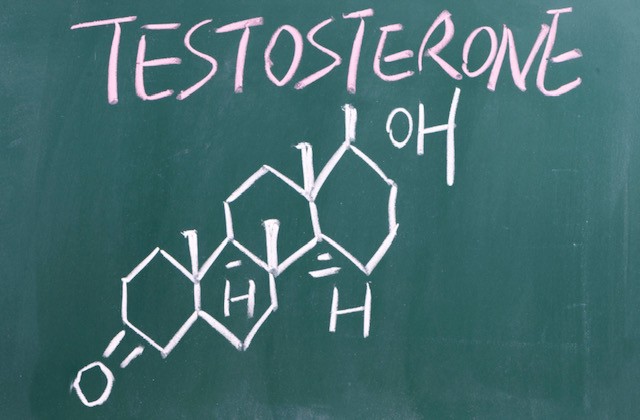

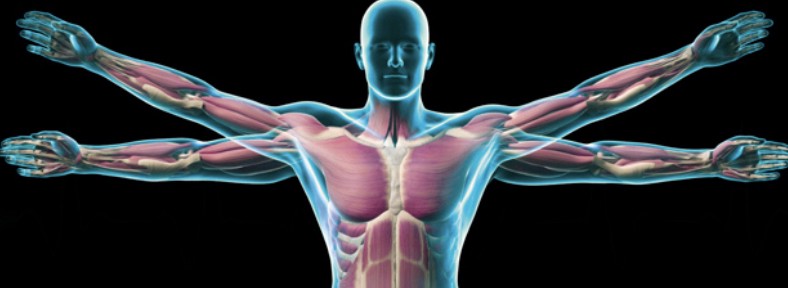

Responses